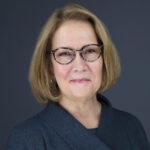Made for this Moment in History
As 2020 drew to a close, the worst pandemic in a century has made for a year like no other in the collective memory of our country.
As the COVID-19 pandemic continues to rage throughout our country and the world, and the death toll in the U.S. now exceeds 400,000, challenges remain. Just as Fannie and John Hertz envisioned, the Hertz Foundation was created for such moments in history.
While much of the country shut down over the past year, Hertz Fellows geared up and leapt into action. Reflecting their commitment to work for the nation’s security in times of national emergency, fellows pivoted in their research and collaborated to address the threat of COVID-19.
Below is a sampling of the work of Hertz Fellows, from the classes of 1968 to 2019, during this time of crisis:
- Po-Shen Loh, associate professor of mathematics at Carnegie Mellon University, led the team that developed NOVID, the first and only COVID-19 app in the world that introduces a new paradigm: alerting people not only after exposure to COVID-19, but before, as infections strike in their interaction network.
- Cheri Ackerman, CEO of Concerto Biosciences, and Cameron Myhrvold, who will join the Princeton University faculty in January, adapted CRISPR technology to create a diagnostic tool that could provide thousands of test results for a suite of viruses in a matter of minutes.
- Emma Pierson, who this spring received her PhD in computer science from Stanford University, helped develop a computer model that accurately predicted the spread of COVID-19 in 10 major cities.Jordan Edmunds, a graduate student in electrical engineering at the University of California, Berkeley, helped develop a low-cost, rapidly scalable, emergency-use ventilator for the COVID-19 crisis.
- Reaching back 20 years to technology developed by Hertz Foundation Board Chair David Galas, Abbott Labs created a COVID-19 rapid-response test.
Transformative work by Hertz Fellows on myriad other fronts continues to be hailed as well. Among the many fellows recognized for their innovation is 2020 MacArthur Fellow Monika Schleier-Smith, associate professor of physics at Stanford University, whose work in understanding and manipulating quantum systems may lay the foundation for advances from new computational paradigms to biomedical imaging and insights into black holes. Schleier-Smith and Jeremy England, senior director in artificial intelligence at GlaxoSmithKline and principal research scientist at Georgia Institute of Technology, both received research awards from the American Physical Society.
Katelin Schutz, a Pappalardo Fellow and an Einstein NASA fellow in physics at the Massachusetts Institute of Technology, received the APS doctoral thesis prize. She will speak at the Hertz Innovation Hour on January 30.
Cameron Myhrvold was named a STAT 2020 Wunderkind for his work advancing CRISPR technology.
The last several months have been a dramatic reminder that our very lives and livelihoods depend on science and scientific innovation. The foundation is proud of its 64-year record of identifying, supporting, and nurturing our nation’s most promising and creative scientific and technical talent, especially when over half of the PhDs in the United States each year are awarded to students from outside the US.

In this difficult time, the foundation itself is also proving its resilience. We have pivoted as a community, launching online events like Innovation Hour, reimagining our monthly newsletter, and exploring other ways of ensuring Hertz Fellows stay connected. Moreover, our volunteer leadership is continuing the important work of strategic planning to create the road map that will fuel the foundation’s impact for years to come.
None of this work is possible without the generous support of fellows and friends who share our passion for our nation’s leadership in boundary-breaking science and innovation. To those who are active supporters, we are grateful for your commitment and support.
And yet, we are poised to do so much more. Although in 2020 we awarded the largest number of fellowships in more than a decade, each year there are twice as many deserving candidates—young scientists and innovators with the drive and creativity to make an exponential impact on the formidable challenges facing our nation and the world. For the 2021 Fellowship awards, we received over 900 applications from a phenomenally competitive group of students. Imagine if we could unleash the brilliance of all deserving Hertz candidates and fuel their freedom to innovate! Together, we can.
When you invest in the Hertz Foundation, you affirm your belief in the importance of science and technology. It is not too late to join the hundreds of other fellows and friends and help increase the number of Hertz Fellowships we can award this spring.
I invite you to take a moment to explore our website to learn how you can make a gift via cash, check, and/or stock. Perhaps this is the year to make a big statement and create a named or endowed fellowship. Whatever the amount of your gift, it will be put to work to fuel our mission.
We can do more than hope for a better future—together we can create it.
With warm wishes for a year ahead filled with good health and joy,
Robbee Kosak
President, Fannie and John Hertz Foundation
